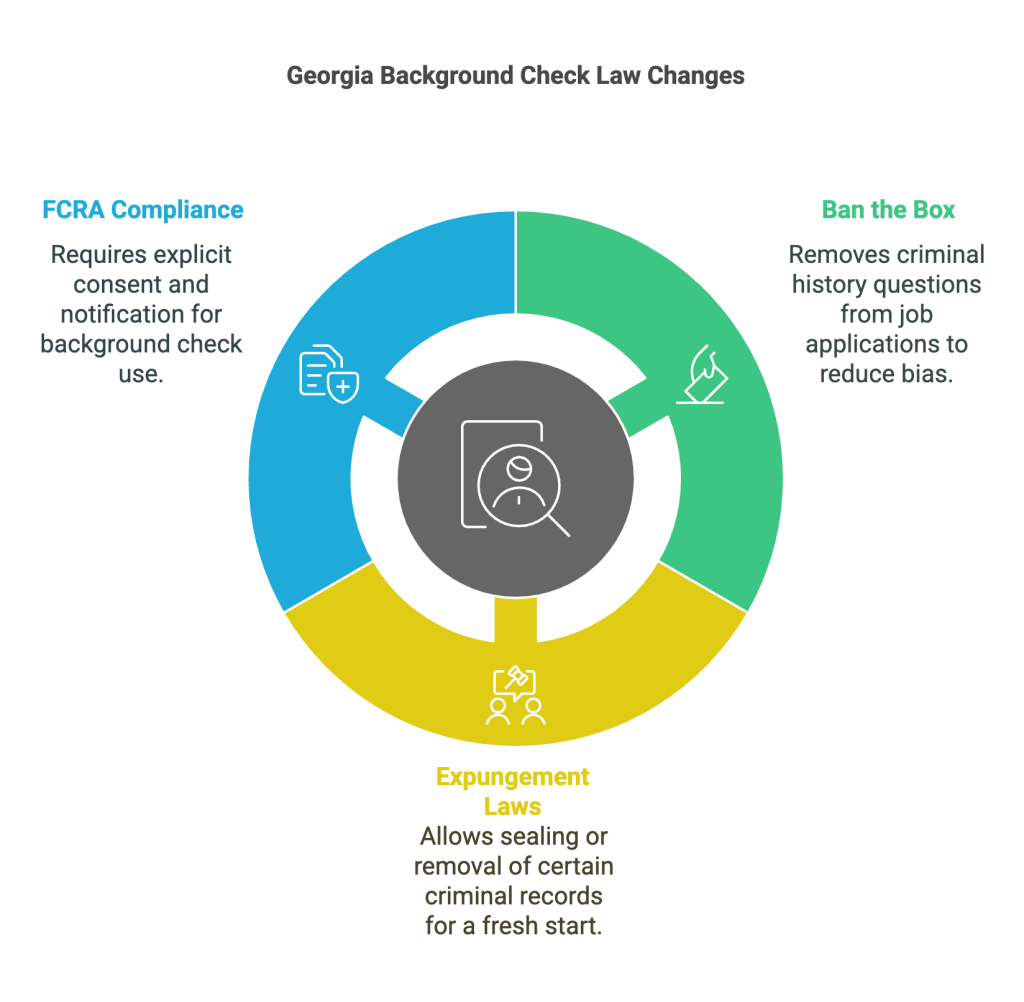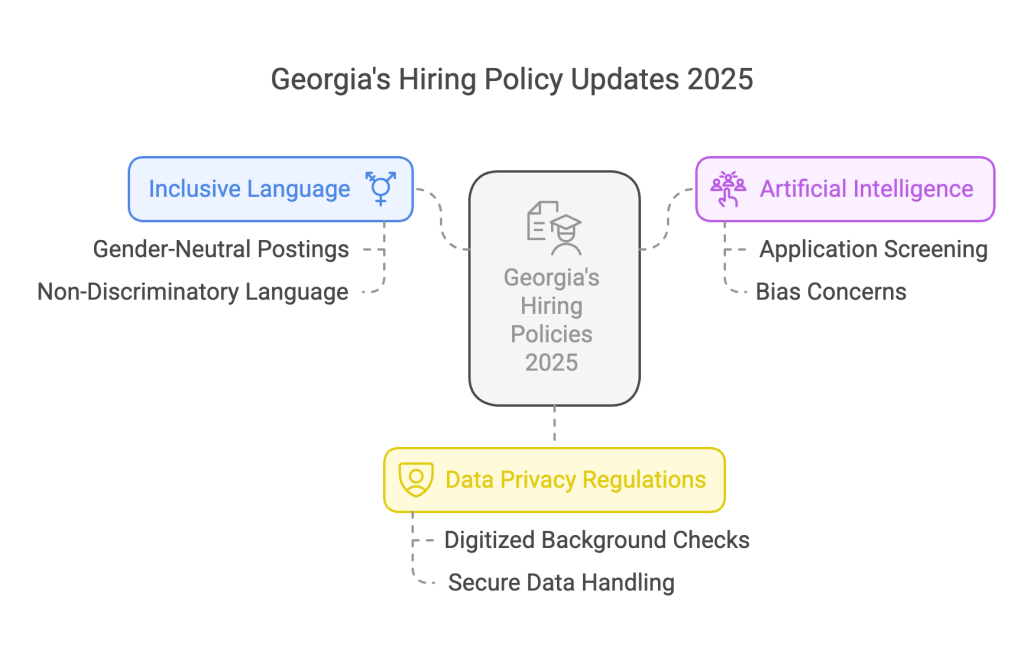The landscape of employment screening in Georgia is evolving rapidly as we move into 2025. With significant updates concerning Georgia background check laws, both employers and job seekers need to stay informed. This comprehensive guide dives into the latest legal, social, and technological shifts that are shaping the future of hiring in Georgia. Weâll also discuss data-driven insights and provide actionable takeaways to help you navigate these changes effectively.
Key Takeaways
- Georgia's background check laws for 2025 focus on fair hiring by eliminating initial criminal record disclosures for state jobs.
- New laws let job seekers seal eligible criminal records, making past mistakes less of a burden.
- Employers must comply with updated Fair Credit Reporting Act rules by getting clear consent for background checks.
- Digital tools speed up background checks but require secure handling to protect candidate data.
- Inclusive practices, such as diverse hiring panels, drive workplace growth by integrating varied perspectives and skills.
Introduction
Background checks play a critical role in Georgiaâs employment process. They're the gatekeepers for employers looking to verify the qualifications and history of potential hires. By reviewing past criminal records, credit reports, and employment histories, employers aim to protect their business and employees. Itâs about risk management and making informed hiring decisions.
Changes in Georgia's background check laws affect both sides of the hiring equation. Recent developments include altering what information can be accessed and how it can be used. This impacts job seekers as wellâparticularly those reintegrating into the workforce after dealing with past legal troubles. For these individuals, new laws may provide avenues to start afresh.
Are you a job seeker wondering about how these changes could impact your prospects? Or an employer navigating the complex web of legal compliance?
Understanding the latest legal shifts is crucial. These laws can influence who gets hired and who doesn't. Knowing your rights and responsibilities helps you stay on the right side of these changes.
Got questions about the new rules?
Letâs dive deeper into how these updates will play out practically for employees and employers alike.
Legal Dimensions
Key Changes in Georgia Background Check Laws
Georgia's background check laws are seeing important shifts as we approach 2025. Understanding these changes can help you make informed decisions in the hiring process.

Ban the Box Georgia: Georgia's Ban the Box initiative is a game-changer for state job applications. This directive removes criminal history questions from preliminary job applications. The goal is to ensure that candidates are not unfairly judged by their past before they have a chance to prove their current qualifications. Empirical data shows that such measures can significantly increase job opportunities for those with prior convictions, helping them reintegrate into the workforce.
Expungement Laws Georgia: Recent reforms to expungement laws in Georgia offer a second chance to many. The new laws enable the sealing or removal of certain qualifying criminal records, effectively giving individuals a cleaner slate. This change allows people to rebuild their lives without the constant shadow of past mistakes looming over potential employment opportunities. It's crucial for employers to stay current with these changes to ensure fair hiring practices.
FCRA Rules Georgia: Compliance with the Fair Credit Reporting Act (FCRA) is non-negotiable for employers in Georgia. Any company conducting background checks needs explicit consent from the candidate. The FCRA also ensures that candidates are notified if any negative information is used against them. Staying current with FCRA regulations is vital, as recent updates may impact how you handle and report credit histories during screenings.
Employment Screening Georgia
Process and Compliance: Navigating the employment screening maze requires diligent adherence to both federal and state laws. In Georgia, this involves obtaining proper consents and ensuring that all checks, including criminal and credit, align with legal mandates. Missteps here can lead to legal repercussions, emphasizing the importance of clear procedures and training for HR teams.
Impact of HR Compliance Georgia: HR departments in Georgia now face the critical task of aligning practices with the new background check laws. This isn't just about avoiding penalties; it's about creating a fair, transparent recruitment process that respects candidate rights while serving organizational needs. Compliance now requires a strategic approach to integrate these legal changes into everyday practices, ensuring both fairness and efficiency.
Social Dimensions
Criminal Record Reforms Georgia
Criminal record reforms in Georgia aim to create a fairer job market. These changes reduce barriers for those with past convictions seeking employment. By enabling these individuals to reintegrate into the workforce, the reforms also help reduce recidivism rates. This shift benefits not only job seekers but society at large.
Under the new laws, certain non-violent crimes can be expunged from records. This makes it easier for former offenders to apply for jobs without the shadow of their past hanging over them. The goal is a second chance at becoming productive members of the community.
For you as a job seeker with a criminal record, understanding your rights is crucial. The reforms grant you the opportunity to apply for many positions without disclosing past convictions upfront. This change levels the playing field, allowing your skills and experience to speak first.
With these reforms, employers in Georgia are encouraged to focus on job qualifications rather than past mistakes. How will this shift influence your hiring process? Will this broaden your candidate pool? The potential for a more diverse workforce awaits those who take a chance on qualified individuals with cleared records.
Georgia's legal landscape is evolving, and so is the world of employment. Stay informed and consider how these changes could positively affect your hiring practices or job search strategies.
Inclusive Hiring Practices Georgia
Inclusive hiring in Georgia is gaining traction, spurred by legal reforms that open the door to a more diverse workforce. Changes in background check laws are designed to clear hurdles that traditionally kept qualified candidates from opportunities simply due to past mistakes.
Take, for example, a company in Atlanta that embraced these reforms. They shifted their focus to skills and potential, not just past records. The result? A richer variety of perspectives and greater innovation within teams. By removing blanket bans on candidates with criminal records, they tapped into an underutilized talent pool, enhancing their hiring process.
For HR managers, this means rethinking your criteria. Maybe youâve overlooked potential due to a candidateâs past. Legal updates in Georgia require you to reassess. Are you aligning job descriptions with what truly matters for the role?
Inclusive practices arenât just about diversity. They make business sense. Companies see gains in employee retention and engagement, as people from all walks of life feel valued. Diversity challenges teams to think outside the box, solving problems with fresh insights.
Consider what inclusive hiring could mean for your organization. Are you equipped to identify barriers in your current process? Could specific biases be limiting your reach? These are the questions modern employers must ask to succeed in a rapidly changing environment.
Adapting to these changes is not only about compliance; it's about competitive advantage. By embracing inclusive hiring, you're building a stronger, more adaptable workforce poised to meet future challenges head on.
Technological Dimensions
Advancements in Employment Screening Technology
Technology is reshaping how background checks are conducted in Georgia.
Digital solutions are making the process faster and more accurate. For instance, online platforms can quickly pull criminal, credit, and employment records. This means less waiting for both employers and candidates.
Automation plays a key role in eliminating human error. Algorithms can check data against various databases, ensuring consistency.
Privacy, however, remains a concern. Employers must balance the need for information with privacy laws. This includes complying with Georgia's data protection regulations.
Cloud-based systems are popular for storing and accessing data. But they come with risks. Ensuring data security involves encrypting sensitive information and using secure servers. Breaches can lead to costly fines and reputational damage.
Biometric technologies are also emerging. Fingerprint and facial recognition streamline identity verification. These methods offer speed but raise ethical questions about consent and storage.
How ready is your organization to adopt these changes?
Effects on Georgia HR Practices
With these technological shifts, HR departments must adapt quickly.
Updating HR systems is crucial. Legacy systems may not integrate well with new technologies. Investing in scalable solutions can future-proof operations.
Training is key. HR professionals need to understand both technology and the legal framework. This includes knowing how the Fair Credit Reporting Act (FCRA) applies in the digital age.
Workshops and seminars can help bridge the knowledge gap. Consider providing regular training sessions to keep your team ahead.
Is your HR team equipped to handle the evolving landscape?
Hiring Policy Updates 2025
Georgia's hiring policies are shifting noticeably as we enter 2025. One trend that's gaining traction is the integration of more inclusive language in job postings. Employers in Georgia are beginning to recognize the importance of using gender-neutral and non-discriminatory language to attract a diverse pool of candidates. This helps create a more welcoming atmosphere and broadens the talent available.

Another trend is the increasing use of artificial intelligence in the initial stages of hiring. AI tools sift through numerous applications, flagging those that closely match job descriptions. This technology saves time and can improve the shortlisting process, though employers need to be careful. Relying too heavily on AI without human oversight can inadvertently reinforce biases present in the models.
Looking ahead, expect tighter regulations around data privacy. As background check processes become more digitized, protecting applicant information remains a priority. You might see new measures to ensure data is handled securely and only by authorized personnel.
For employers, these changes may require a revamp of current HR practices. Are your job descriptions as inclusive as they could be? Are your AI tools operating without bias? Preparing now for further changes will keep you ahead of the curve.
For job seekers, these changes could mean more transparency and fairness in the hiring process. You can feel more confident that your personal data is protected and that you're evaluated based on your skills and qualifications.
As Georgia's hiring policies evolve, staying informed will help you navigate the job market with confidence.
Actionable Takeaways
For Employers
- Understand the Legal Changes: Familiarize yourself with the updates to Georgia's background check laws such as Ban the Box and reforms in expungement. This understanding will help you adjust your hiring policies accordingly.
- Develop Clear Policies: Create or update your hiring policies to reflect legal changes. Ensure these policies are documented and easily accessible to your HR team.
- Training is Key: Train your HR personnel on the new laws to prevent any legal missteps. This also includes understanding how to conduct background checks that comply with the Fair Credit Reporting Act (FCRA).
Inclusive Hiring Practices: Embrace processes that support fair hiring. Remove initial criminal record questions on job applications to widen your candidate pool and promote diversity.
- Create a Compliance Checklist: Keep a checklist handy to ensure every step of your hiring process complies with Georgiaâs background check regulations. Regular audits of your practices can prevent unintentional violations.
For Job Seekers
- Know Your Rights: Understand your rights under Georgiaâs new expungement and Ban the Box laws. You have more avenues to clear your record or avoid early-stage discrimination.
- Seek Expungement: If eligible, take steps to have certain criminal records sealed. This can improve your employment prospects by ensuring past mistakes arenât obstacles.
- Prepare for Background Checks: Know what employers may find. Obtain a copy of your own report to prep for potential questions during your job search.
- Use Resources Wisely: Various organizations provide guidance on navigating employment barriers. Leverage these resources to gain insights and assistance in clearing your record.
Communicate Clearly: When necessary, be prepared to discuss your past candidly while emphasizing your qualifications. Practice how to address any past offenses effectively without focusing on negatives.
Employers and job seekers in Georgia have much to consider amid recent legal updates. Being informed and proactive in using these changes can foster a more inclusive and compliant workplace.
Conclusion
Georgia's employment landscape is changing. Updates to background check laws for 2025 demand attention. Employers should integrate these changes into their hiring processes to ensure compliance and fairness. Job seekers, equipped with knowledge of their rights, can better navigate the job market.
Remember, the Ban the Box initiative opens doors by removing initial criminal record inquiries for state jobs. Expungement reforms offer opportunities to clear past mistakes. Both matter in creating a level playing field.
The Fair Credit Reporting Act remains a staple. Its impact, though, is evolving in Georgia's context. For employers, this means staying updated to avoid legal pitfalls. For job seekers, it means understanding how credit info can affect job opportunities.
Technology also plays a role. Digital tools are streamlining processes, but they bring data security challenges. HR departments must not only adapt their systems but also train for the future.
Georgia's push toward inclusive hiring strengthens workplace diversity. It aligns with broader reforms aiming for less recidivism and greater job access for all.
Stay proactive. Employers, review your compliance checklists. Job seekers, know your rights and opportunities for expungement. Everyone has a part to play in building a fairer job market.
Frequently Asked Questions (FAQs)
What are the major updates to Georgia background check laws in 2025?
In 2025, Georgia introduced several changes to its background check laws. Key updates include stricter privacy protections and clearer guidelines on using criminal histories. The new laws limit what past convictions employers can consider and for how long they can consider them.
Are background checks mandatory for all jobs in Georgia?
Background checks are not mandatory for all jobs. However, they are often required for positions that involve safety, security, or trust. Employers in sectors like healthcare, education, and financial services typically conduct these checks.
How does Georgiaâs Ban the Box law impact employers?
Georgia's Ban the Box law restricts employers from asking about criminal history on initial job applications. Employers can discuss a candidate's criminal past later in the hiring process, ensuring fair consideration based on qualifications first.
What industries in Georgia have stricter screening requirements?
Industries like healthcare, childcare, and finance have stricter screening requirements. For example, healthcare workers undergo exhaustive checks to protect patient safety, while finance sector employees are screened to uphold financial integrity.
Can Georgia employers check social media profiles during background checks?
Employers in Georgia can review public social media profiles as part of background checks. However, they must navigate privacy concerns and avoid discrimination, basing employment decisions on professional qualifications rather than personal information.
Are there penalties for non-compliance with Georgia background check laws?
Yes, non-compliance can lead to legal action and financial penalties. Employers must adhere to state laws and regulations or face potential lawsuits from aggrieved employees or applicants.
Can you challenge a background check result in Georgia?
Yes, if you believe a background check result contains errors, you can dispute it. Contact the screening company for a review. You also have the right to provide explanations or additional context to an employer if needed.
Do Georgia background checks include credit history?
Some checks do include credit history, especially in financial roles. Employers must obtain your consent before checking your credit and provide a legitimate reason for requiring this information.
How long can a criminal record affect employment eligibility in Georgia?
The effect of a criminal record varies based on the crime and the job. Certain convictions may only be considered for a limited time, while violent or serious offenses might have lasting impacts. The specific policies can also differ from one employer to another.
What consent is needed for conducting background checks in Georgia?
Before performing a background check, employers must have written consent from you. You should be informed about the type of information that will be collected and how it will be used.

GCheck Editorial Team
Meet the GCheck Editorial Team, your trusted source for insightful and up-to-date information in the world of employment background checks. Committed to delivering the latest trends, best practices, and industry insights, our team is dedicated to keeping you informed.
With a passion for ensuring accuracy, compliance, and efficiency in background screening, we are your go-to experts in the field. Stay tuned for our comprehensive articles, guides, and analysis, designed to empower businesses and individuals with the knowledge they need to make informed decisions.
At GCheck, we're here to guide you through the complexities of background checks, every step of the way.






